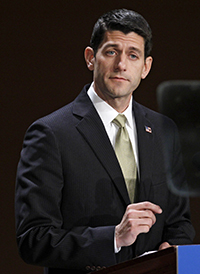This post first appeared on Politico.com. Author and legal scholar Ian Haney López recently appeared on Moyers & Company to talk with Bill about his book, Dog Whistle Politics: How Coded Racial Appeals Have Reinvented Racism and Wrecked the Middle Class.

Paul Ryan during a campaign rally at the Walter B. Waetjen Auditorium at Cleveland State University in Cleveland. October 2012. (AP Photo/Tony Dejak)
Paul Ryan triggered a firestorm of recrimination this week. Speaking recently on Bill Bennett’s Morning in America radio program, the Wisconsin Republican and self-styled budget wonk linked poverty to “this tailspin of culture, in our inner cities in particular, of men not working and just generations of men not even thinking about working or learning the value and the culture of work.”
Setting aside the factual claim — the notion that poverty is especially concentrated in America’s inner cities is an increasingly antiquated one — these comments elicited a quick and forceful rebuke from Rep. Barbara Lee (D-CA), who decried them as “a thinly veiled racial attack.” She explained: “[W]hen Mr. Ryan says ‘inner city,’ when he says, ‘culture,’ these are simply code words for what he really means: ‘black.’”
Ryan has since backpedaled, protesting that race was nowhere in his thoughts: “This has nothing to do whatsoever with race. It never even occurred to me. This has nothing to do with race whatsoever.”
Maybe so, but there’s a history here that the Republican Party can’t ignore — one that explains why Lee was so quick to jump on his comments, why the Congressional Black Caucus announced themselves “deeply troubled” by remarks they described as “highly offensive” and why so many others have sharply criticized Ryan.
By calling out his use of “code words,” Lee put Ryan in the company of past politicians who have blown the proverbial dog whistle — using surreptitious references to race to garner support from anxious voters. Examples of dog whistling include Barry Goldwater’s endorsement of “states’ rights”; Richard Nixon’s opposition to “forced busing”; Ronald Reagan’s blasts against “welfare queens”; and George H.W. Bush’s infamous Willie Horton ad.
These instances of racial pandering typically have been treated as disconnected eruptions, when in fact the GOP has made a concerted effort to win support through racial appeals. This pattern is so entrenched — and so well known — that two different chairs of the Republican National Committee have acknowledged and apologized for this strategy.
“By the seventies and into the eighties and nineties,” RNC chair Ken Mehlman said in a 2005 speech before the NAACP, “Republicans gave up on winning the African-American vote, looking the other way or trying to benefit politically from racial polarization. I am here today as the Republican chairman to tell you we were wrong.” Five years later, his successor Michael Steele similarly acknowledged that “for the last 40-plus years we had a ‘Southern Strategy’ that alienated many minority voters by focusing on the white male vote in the South.”
Despite the mea culpas, race baiting has continued: recall New Gingrich’s 2012 tarring of Barack Obama as “the best food-stamp president in American history.” Or consider another Gingrich jibe from the last election: “Really poor children in really poor neighborhoods have no habits of working and have nobody around them who works,” he claimed. “So they literally have no habit of showing up on Monday. They have no habit of staying all day. They have no habit of ‘I do this and you give me cash,’ unless it’s illegal.”
What, then, of Paul Ryan? Was he dog whistling? To many, his strong echoing of Gingrich, coupled with the larger GOP history of racial pandering, suggested so. Nor did Ryan help himself by invoking the conservative scholar Charles Murray — a man who co-wrote a controversial 1994 book, The Bell Curve, tying intelligence to race, and who in 2000 explained that genetics will likely show, “One reason that we still have poverty in the United States is that a lot of poor people are born lazy.”
But what of Ryan’s insistence he did not consider race whatsoever, or his later explanation that he had been “inarticulate” in his comments? Perhaps Ryan genuinely did not recognize the racial narrative embedded in his remarks about an inner city culture that devalues work. But at best, this suggests that Ryan has uncritically adopted the charged rhetoric of his party without understanding its racial undertones.
Less charitably, in weighing Ryan’s protestations of innocence, we should be clear that denying racial intent is par for the course in dog whistling. The whole point of speaking in coded terms is to transmit racial messages that can be defended as not about race at all. Today’s broadly shared anti-racist ethos condemns naked appeals to racial solidarity; those politicians who nevertheless seek to trade on racial provocations must do so in ways that maintain plausible deniability.
Another defense is to insist that Ryan is no bigot. Here’s one version, from Republican political strategist Ron Christie: “Rep. Paul Ryan (R-WI) is not racist nor did he blow a ‘dog whistle’ to launch a thinly veiled racist attack against black people. I offer this from the perspective of someone who has known Paul for more than 20 years: there is not a racist bone in his body.” The fact that Christie is black no doubt lends credibility to his testimony.
Of course, an individual’s mindset in any particular instance is almost impossible to know. We cannot be certain what Ryan intended. Nevertheless, there’s no doubt that Ryan employed rhetoric closely connected to a dismal history of Republican racial demagoguery.
Barbara Lee was correct to respond forcefully. In our political culture, dog whistling all too often takes the form of warnings about a “tailspin of culture” in the “inner cities” and “generations of men not even thinking about working.” Sharply rebuked, hopefully Ryan and others will think twice — or, if Ryan is to be believed, then think for the first time — about using political rhetoric imbued with ugly racial stereotypes.



